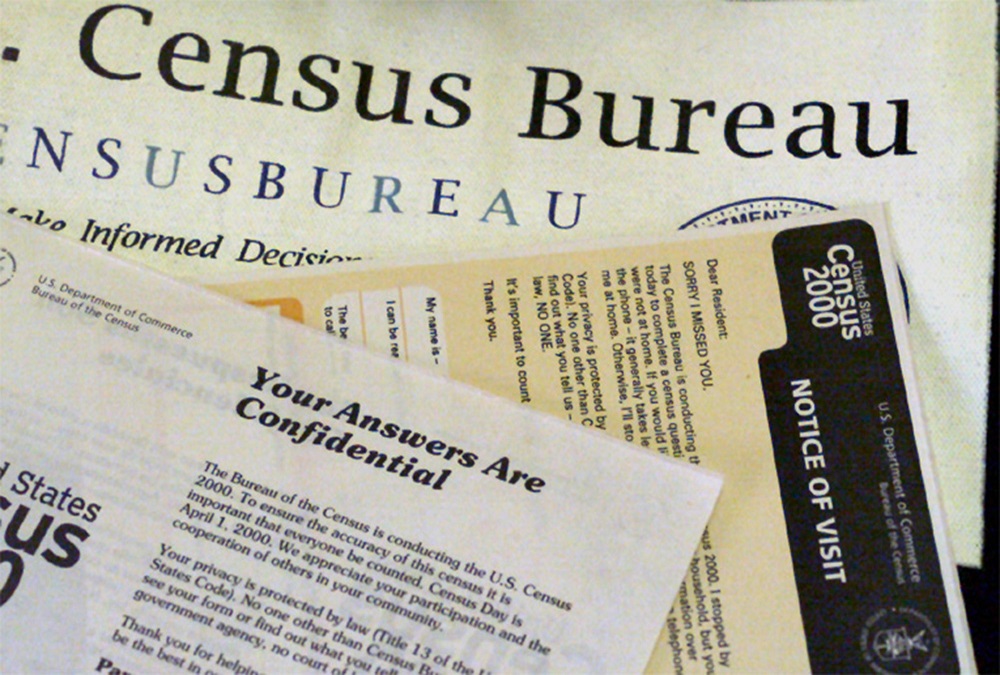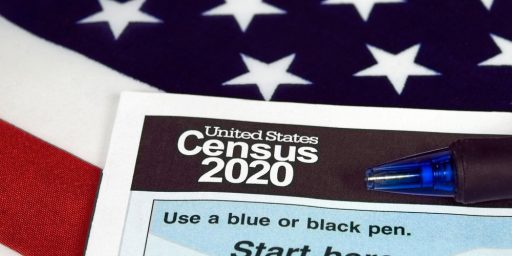Census Constitutionally Required to Ask Citizenship Question?
A novel argument, untested in court, suggests that it might.

Josh Blackman, an incredibly prolific young law professor at South Texas, makes an intriguing argument with regard to the ongoing controversy, now before the US Supreme Court, as to whether the Census may include a citizenship question: the Fourteenth Amendment may actually require it.
His reasoning is complicated but here’s the gist:
While the census counts the “whole number of persons” to establish the “actual enumeration,” Section 2 of the Fourteenth Amendment requires an additional piece of information: “the whole number of male citizens twenty-one years of age in such State.” (I will table for now whether subsequent amendments—the Nineteenth Amendment and Twenty-Sixth—impliedly modified that clause to also require a count of the number of female citizens over the age of eighteen.)
If this argument is correct, then the government would not only be justified in counting the number of citizens in a given state; Section 2 would require the government to have this information available, in the event that a state deprived males (and females) of the right to vote. This is an obligation: the representation “shall be reduced.” And Congress would not be able to enforce Section 2 without an additional enumeration based on citizenship. An estimate would not suffice.
Moreover, the number of citizens must be counted in advance. It would subvert the operation of Section 2 to wait until the next decennial census to count citizens. The waiting period could be as long as ten years. This information need not be collected in conjunction with the census. But it would be reasonable for the government to utilize the census process to collect this additional information. And once the government knows the total number of citizens, it can then discount minor citizens.
— The Volokh Conspiracy, “Is the Government Required to Count the Number of Citizens in Each State?“
Blackman, who has published voluminously on Constitutional law and testified before Congress and elsewhere as an expert raises this as an inquiry—not included in any of the amicus briefs that accompanied the current case—and not as a definitive argument. Eugene Volokh passes it along as interesting but sufficiently outside his expertise that he’s not going to pass judgment.
While I had quite a lot of coursework in Constitutional law and related matters in my undergraduate and masters studies three decades back, I’m considerably less qualified than either Blackman or Volokh to render judgment on this. But it’s an interesting and plausible argument that I’ve not seen elsewhere.
Looking to see if I could find others elsewhere addressing the point—I couldn’t—I stumbled on an interesting piece from political scientist James Piereson, currently president of the William E. Simon Foundation and a senior fellow at the Manhattan Institute. It’s long, covering a wide range of related issues and a survey of Supreme Court cases on the matter. But here’s the bit that intrigued me:
In Evenwel, the Court ruled that the state of Texas could use population as the basis for legislative districts, in part because, as the state maintained, detailed information on citizenship and registered voters was unavailable or too unreliable to be used for legislative districting and the proposed alternatives to population were unworkable. But the justices, following the precedents established in Reynolds and Burns, stopped short of saying that states must use population as the standard, thus leaving the door open for states in the future to use some other metric (e.g., the number of citizens or registered voters) as the basis for representation. As Justice Samuel Alito wrote in a concurring opinion, “Whether a state is permitted to use some measure other than total population is an important and sensitive question that we can consider if and when we have before us a state districting plan that, unlike the current Texas plan, uses something other than total population as the basis for equalizing the size of districts.” Justice Clarence Thomas elaborated on this theme in writing in a separate concurrence that states should be left free to experiment with other metrics, such as “total population, eligible voters, or any other nondiscriminatory voter base.” The Supreme Court has thus left up in the air the issue of whether representatives at the state and local levels must be allocated on the basis of total population, citizenship, eligible voters, or some other metric.
In response to Evenwel, several states have taken steps to apportion legislative districts on the basis of citizenship. Missouri recently approved a constitutional amendment that would accomplish this goal. A similar measure is under consideration in Nebraska, though that state (like Missouri) has a small number of legal and illegal immigrants, in comparison with such states as California, Florida, and Texas. In any event, the issue is beginning to move in states across the country. In the likely event that some states move further in this direction, they will certainly face lawsuits challenging those moves, with the Supreme Court being asked eventually to resolve the unanswered questions from the reapportionment cases.
This is one reason that the citizenship question on the U.S. Census now carries so much weight: it will provide a factual basis to test claims about the appropriate foundations for legislative and congressional representation. If the citizenship question goes forward, state governments will have the information they need to apportion legislative and congressional districts on some basis other than total population.
— City Journal, “Citizenship and the Census“
It’s interesting that there are still interesting, unresolved legal questions surrounding the Census—part of the original Constitution in place since 1789—and the 14th Amendment—ratified in 1868—but there are.
Piereson’s piece ultimately gets to a philosophical question: do we actually want citizenship to matter? But that’s a question for a different discussion.
Hat tip: Dave Schuler


I see this argument moving in two directions:
1) Democrats will ask questions about what is fair and what is practical. Are people being excluded? Are others being over represented? Apart from voting issues, to what other uses is the census being used, and what will be the consequences?
2) Republicans will ask if men will profit over women, whites over non-whites, citizens over (illegal) immigrants, Red states over Blue. Basically: can they game the system? If so, then the question is how best to justify it.
I’ve read that section of the 14th Amendment three times after reading this and the Volokh post and I’m still not sure what it means or if Blackmon is right in his analysis. It appears that what the section is designed to do is give Congress a way to punish states that denied the right to vote to African-Americans and others legally eligible to vote by reducing the number of Electoral Votes based on the number of citizens in the state. Whether this means that the Feds are constitutionally mandated to ask a citizenship question or not is entirely unclear.
@Doug Mataconis: I think you’re right as to what the intent was, although Blackmon supplies some contemporaneous evidence that at least some thought the Census needed to do it. I’m always skeptical of arguments that 1868 Amendments are required to do things that haven’t been required in their 150-year existence but it’s an interesting reading.
The issue with the question is the sheer Trumpiness of it. If an Obama or even Bush the younger administration had placed it in, it might have been controversial, but not so hard fought. With El Cheeto at the head, one has to ask “whom does he expect to hurt with this?” and the answers are many.
I’m confused and hope someone will answer this question. What would be the advantage of setting districts based on anything but population? Setting districts based on eligibility to vote ( age and citizenship) or just citizenship would be a disadvantage to all states including NC, SC, AL, WI which employ large numbers of immigrant labor. Add to that making the assumption non-citizens would not participate in the census would lower representation and electoral votes. I’m sure I’m missing something here, what is it?
@Mr. Prosser:
There are two issues here.
First, the overall count for each state. You’re right: every state would want to count as many people as they can to maximize their represenatation. BUT there’s a competing interest created by the fact that the vast number of unauthorized immigrants are concentrated in a handful of states (just four, according to Piereson).
Second, the drawing of district lines within a state after apportionment. At this point, Congress has determined how many Representatives each state gets pursuit to the latest Census and the states then draw the lines. The Supreme Court has forbad them from having districts substantially unequal in population and imposed various other restrictions. Some states have determined that it is advantageous to use registered voters, eligible voters, or some other criterion than raw population.
Well I read the section and like you said the point of the article is to exclude voters if they commit treason again; the section itself discusses counting everyone not just citizens. This is another instance of overlawyering: one can make any argument on any issue and somehow find some dubious clause to support it-sadly too many judges also fall for this trap.
@Mr. Prosser:
I’ve a feeling this is about either immigration or intimidation.
If the first, I’d expect that contrary to law and norms, census data of people who answer they’re not citizens will be passed to ICE.
If the second, they expect many undocumented immigrants won’t return the forms, and thus there’d be an undercount in some places.
The subject section of the amendment seems straightforward enough. What it says is simply that we ain’t doin’ this 3/5 shit anymore, nor anything like it.
If your state denies the right to vote to otherwise eligible voters, you lose representation proportionally. If you deny 25% of your voters, you lose 25% of your representatives, and with them, Electoral College electors.
Nothing in the amendment requires, or as far as I can see, implies, any involvement by the census.
No one’s seen the need to look at this since ratification. But, since Blackman brings it up, it would seem on it’s face to require that the Federal Government determine how many otherwise eligible voters are being prevented from voting by the catalog of Republican techniques: ID laws. inadequate provision of polling places and machines, obstacles to registration, overly aggressive purging of rolls, slow walking the new FL initiative to reinstate ex felons, and so on. (This obvious implication may explain why the rest of the Wingnut Welfare legal “scholarship” establishment hasn’t gone here.)
Texas has 36 Representatives. If they state can be shown to have suppressed 3% of the vote, the Amendment requires they lose a Representative. Seems to be black letter. I’d suggest shooting Louie Gohmert, but I might be open to other procedures.
@gVOR08:
Sure. But how do we know who the “otherwise eligible voters” are without a count of citizens?
This strikes me as more than a stretch. There’s a long history of denying rights to ex-felons and most of the rest have always been left to the discretion of the states.
What male and 21 means after a long history of modifying requirements would keep a few lawyers employed, as would “except for participation in rebellion, or other crime” after the state has amended the constitution to explicitly allow ex-felons to vote. But otherwise the wording seems quite clear. Do Republicans really want to go here? That we let them get away with vote suppression in the past seems a weak legal argument. On the other hand, they do have Boof and Kavanaugh.
As to methodology, something like the ACS targeted on the suspect state would seem a much better vehicle than a decennial census question that contributes nothing to counting denied votes.